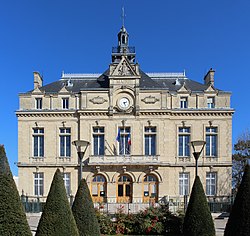Battle of Villiers
1870 in FranceBattles in Île-de-FranceBattles involving WürttembergBattles of the Franco-Prussian WarDecember 1870 events ... and 2 more
History of Val-de-MarneNovember 1870 events

The Battle of Villiers, also called the Battle of Champigny, was the largest of the French sorties from besieged Paris during the Franco-Prussian War.
Excerpt from the Wikipedia article Battle of Villiers (License: CC BY-SA 3.0, Authors, Images).Battle of Villiers
Rue du Panorama, Nogent-sur-Marne
Geographical coordinates (GPS) Address Nearby Places Show on map
Geographical coordinates (GPS)
| Latitude | Longitude |
|---|---|
| N 48.8172 ° | E 2.5156 ° |
Address
Centre Sportif Nelson Mandela
Rue du Panorama
94500 Nogent-sur-Marne
Ile-de-France, France
Open on Google Maps









